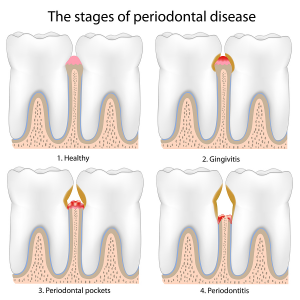At New Dental Images in Elk Grove, we treat gum disease, periodontal disease and gingivitis. Periodontal disease, also known as gum disease or gingivitis, is estimated to be the second most common disease worldwide. Beginning with bacterial overgrowth and potentially ending in tooth loss, periodontal disease develops to some degree in many adults and in some teenagers, often without detection.
Gingivitis
Gingivitis, the disease’s mild form, occurs when a buildup of bacteria in
plaque infects the gums and causes inflammation.  The gums may redden, become swollen or bleed easily along with persistent bad breath or an unpleasant taste in the mouth. These symptoms are often painless and no irreversible bone or tissue loss takes place at this stage.
The gums may redden, become swollen or bleed easily along with persistent bad breath or an unpleasant taste in the mouth. These symptoms are often painless and no irreversible bone or tissue loss takes place at this stage.
If bacterial growth below the gum line becomes unsustainable, gingivitis can advance to periodontitis. In this more severe stage, bacterial toxins and the immune system’s infection response begin to wear away at the inner layer of the gum and bone. This process creates spaces called pockets that collect debris and become even more infected. As more of the bone and tissue that hold teeth in place are destroyed, teeth begin to loosen and may have to be removed. More adult teeth are lost to gum disease than to any other cause.
Preventing Gum Disease
Because symptoms can go unrecognized for some time, regular professional dental examinations are critical to identifying and preventing the growth of gum disease. Before making a diagnosis, checks are made for gum inflammation, improper tooth alignment, and pocket depth using a tiny ruler called a periodontal probe. Additionally, an X-ray can detect whether any bone surrounding the teeth has been lost.
Treatments may vary depending on the extent of the disease, but commonly begin with a nonsurgical deep-cleaning procedure called scaling and root planing. This anesthetized procedure scrapes away plaque buildup along the gum line and smoothens the tooth root’s rough spots to remove bacteria and prevent their growth. Antibiotics may be used in conjunction with this procedure to help further control bacteria. If these treatments are not enough to reverse the disease, bone and/or gum tissue surgery may be needed.
Give Us A Call
Regardless of oral health, steps can be taken to reduce or prevent infection in the mouth. Thorough daily flossing and twice daily brushing, biannual professional dental care, and immune strengthening through a nutrient-dense diet and stress reduction can significantly help to maintain a healthy smile. If you think you may have any symptoms of gum disease in Elk Grove, contact Dr. Dang’s dentist office and schedule an appointment.
